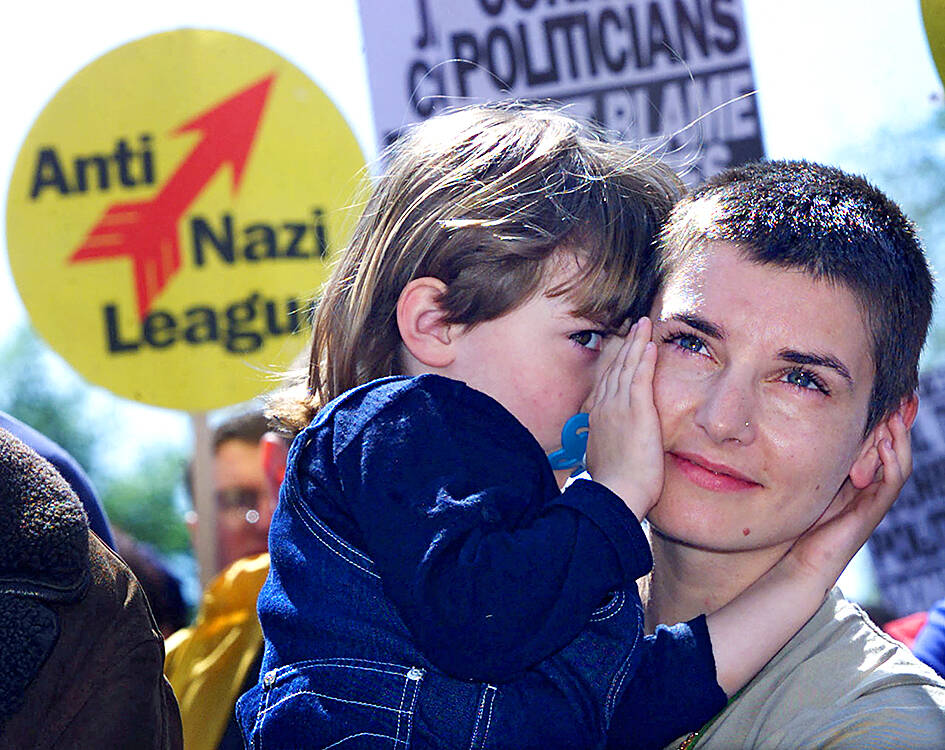Sinead O’Connor will forever be remembered as the Irish singer who made Prince’s Nothing Compares 2 U her own, turning it into an anthem for the broken-hearted.
With a simple video shot in winter at a deserted park on the outskirts of Paris, she delivered a song of real and raw emotion encapsulating perfectly love and loss.
Staring at the camera, her mesmerizing elfin features accentuated by a distinctive shaven head, her real tears powerfully embodied a life and soul stripped bare.

Photo: Reuters
In public and in private, it was a characteristic of her celebrated, eclectic and often controversial career and life.
From the 1980s, she released 10 solo albums, from the multi-platinum “I Do Not Want What I Haven’t Got” to 2014’s “I’m not Bossy, I’m the Boss,” drawing on everything from traditional Irish music to blues and reggae.
Born in 1966 in County Dublin, Sinead Marie Bernadette O’Connor was the third of five children born to parents who went through a bitter divorce. She described herself as a child “kleptomaniac” in 2013, a way of dealing with abuse she called “Sexual and physical. Psychological. Spiritual. Emotional. Verbal” in a 1992 interview.

Photo: EPA-EFE
She was arrested several times before being sent to a church-run correctional facility where a sympathetic nun encouraged her to pursue music, buying her a guitar.
O’Connor began busking on the streets of Dublin and singing in pubs, where a need to be heard above the din helped her to develop her commanding voice.
She moved to London and produced her first album aged 20 while heavily pregnant. A request from her record company to soften her image backfired and cemented her punk style.

Photo: Reuters
“They took me out to lunch and said they’d like me to start wearing short skirts and boots, grow my hair long and do the whole girl thing. What they were describing was actually their mistresses,” she told the Daily Telegraph.
A trip to a Greek barber followed and O’Connor asked him to shave her head.
“He didn’t want to do it, he was almost crying,” she recalled. “I was delighted with it.”

Photo: EPA-EFE
Her 1987 debut “The Lion and the Cobra” became a cult sensation, followed three years later by “I Do Not Want What I Haven’t Got,” which contained her breakthrough hit.
“I suppose I’ve got to say that music saved me,” she said in 2013. “It was either jail or music. I got lucky.”
She began playing to sold-out gigs — her striking appearance and unmistakable voice making her a star around the world.
O’Connor quickly developed a name for inflammatory outbursts and caused an international controversy in a 1992 performance on US television show Saturday Night Live.
While dressed in a white lace dress and performing Bob Marley’s War, O’Connor sang the words “child abuse” before tearing up a picture of Pope John Paul II and declaring “Fight the real enemy!”
The abuse of children by Catholic priests in Ireland was not yet widely known and O’Connor’s gesture sparked widespread criticism. A steamroller crushed a pile of her CDs and tapes in front of her recording company’s office in New York, and the incident dealt a blow to her popularity. Following albums failed to reach the commercial success of her previous work.
In the mid-1990s O’Connor’s personal life began to draw more attention than her music, including a bitter custody battle over her young daughter with a former partner.
In 1999 she was again the center of an uproar when she was ordained a priest by a dissident bishop in a ceremony not recognized by the mainstream Catholic Church, which does not accept women priests.
A year later O’Connor signed a new deal with Atlantic Records and released a series of new albums, including the traditional Irish-inspired “Sean-Nos Nua” and reggae album “Throw Down Your Arms.” An announced retirement from music in 2003 did not last long.
O’Connor was married four times and had four children, the eldest born in 1987 and the youngest in 2006.
She gained a reputation for colorful public statements, writing a column in the Irish Independent in 2011 explaining that her love life was so bad that “inanimate objects are starting to look good” and soliciting applications from potential partners.
“Must not be named Brian or Nigel,” she specified.
Her 2014 album “I’m Not Bossy, I’m the Boss” was well received but she was forced to cancel touring in mid-2015, citing exhaustion.
Her posts on social media became increasingly unfiltered, often threatening legal action against former associates, referring to physical and mental health difficulties and discussing troubles with her family and children. In November 2015 she announced on Facebook that she had “taken an overdose” while booked anonymously into a hotel, but was found safe by police.
And in June 2016, Chicago police received a tip she might have been threatening to jump off a bridge, but she dismissed the rumors as “false and malicious gossip”.
The musician converted to Islam and changed her name to Shuhada’ Sadaqat in 2018.
Ireland’s President Michael Higgins said Ireland had lost “one of our greatest and most gifted composers, songwriters and performers of recent decades”.
He praised O’Connor’s “fearless commitment to the important issues which she brought to public attention, no matter how uncomfortable those truths may have been.”

May 26 to June 1 When the Qing Dynasty first took control over many parts of Taiwan in 1684, it roughly continued the Kingdom of Tungning’s administrative borders (see below), setting up one prefecture and three counties. The actual area of control covered today’s Chiayi, Tainan and Kaohsiung. The administrative center was in Taiwan Prefecture, in today’s Tainan. But as Han settlement expanded and due to rebellions and other international incidents, the administrative units became more complex. By the time Taiwan became a province of the Qing in 1887, there were three prefectures, eleven counties, three subprefectures and one directly-administered prefecture, with

It’s an enormous dome of colorful glass, something between the Sistine Chapel and a Marc Chagall fresco. And yet, it’s just a subway station. Formosa Boulevard is the heart of Kaohsiung’s mass transit system. In metro terms, it’s modest: the only transfer station in a network with just two lines. But it’s a landmark nonetheless: a civic space that serves as much more than a point of transit. On a hot Sunday, the corridors and vast halls are filled with a market selling everything from second-hand clothes to toys and house decorations. It’s just one of the many events the station hosts,

Among Thailand’s Chinese Nationalist Party (KMT) villages, a certain rivalry exists between Arunothai, the largest of these villages, and Mae Salong, which is currently the most prosperous. Historically, the rivalry stems from a split in KMT military factions in the early 1960s, which divided command and opium territories after Chiang Kai-shek (蔣介石) cut off open support in 1961 due to international pressure (see part two, “The KMT opium lords of the Golden Triangle,” on May 20). But today this rivalry manifests as a different kind of split, with Arunothai leading a pro-China faction and Mae Salong staunchly aligned to Taiwan.

Two moves show Taichung Mayor Lu Shiow-yen (盧秀燕) is gunning for Chinese Nationalist Party (KMT) party chair and the 2028 presidential election. Technically, these are not yet “officially” official, but by the rules of Taiwan politics, she is now on the dance floor. Earlier this month Lu confirmed in an interview in Japan’s Nikkei that she was considering running for KMT chair. This is not new news, but according to reports from her camp she previously was still considering the case for and against running. By choosing a respected, international news outlet, she declared it to the world. While the outside world